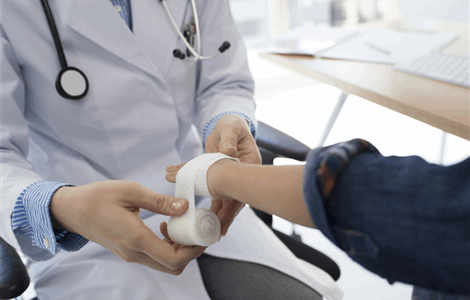
Often an infection develops on the surface of the skin, but it may continue deeper into the injury. You may be able to handle mild skin infections at home, but you will need to go to a doctor or urgent care for a more severe infection. In this article, we describe how to spot and treat an infected wound and when to our GP infection control in Manilva.
Is my wound infected?
If you suspect the skin may be infected, look out for the following symptoms:
- Pus or fluid leaks out of the cut
- Red skin around the wound
- A red streak that runs from the cut toward your heart
- A pimple or yellowish crust on top
- Sores that look like blisters
- Pain that gets worse after a few days
- Swelling that gets worse after a few days
- A fever
- The wound hasn’t healed after ten days
It may be difficult to determine the difference between infection and eczema, particularly in infants. Individuals with eczema also develop skin infections as their skin breaks down and they get germs. When an eczema remedy doesn't work, or if the rash progresses worse, there may be an infection.
Treating infected wounds at home
Individuals with a moderate minor wound infection can often be able to handle the wound at home and won't need to call our GP infection control in Manilva. But more serious wound infections need immediate medical treatment, especially those which appear along with other symptoms such as fever, irritation, or discharge, and red streaks from the wound.
If you think you have an infected wound follow the following steps:
- Before starting, make sure that all necessary equipment is sanitised. For instance, if you use tweezers, first clean them with alcohol.
- Clean your hands properly with soap and warm water.
- Clean the cut or scrape with warm water and the surrounding skin with warm, soapy water. Avoid getting soap in the wound.
- Ensure there is no dirt or contaminants in the cut, such as glass or gravel. To eliminate debris, either use a tweezer or gently clean the wound with a smooth, moist cloth.
- Apply a thin coat of antiseptic ointment or petroleum jelly to the cut or scrape if necessary.
- Enable the skin to air-dry before covering with a gauze or a bandage. If the wound is small this step won't be necessary
When to call our GP infection control in Manilva
Call our GP infection control in Manilva if:
- the wound is deep, large, or has jagged edges
- if you have fever, increasing pain or redness, or discharge from the wound
- it is not possible to clean the wound properly or remove all debris, such as glass or gravel
- the cause of the wound was a bite or an injury from a dirty, rusty, or contaminated object
Call our GP infection control in Manilva immediately if blood is spurting from the wound or if applying pressure to the wound does not stop the bleeding.